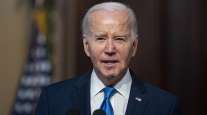ATA: Sleep Study Fails to Justify HOS Change
This story appears in the Nov. 21 print edition of Transport Topics.
A university sleep study cited by federal regulators in a proposed hours-of-service rule is “insufficient” to justify changing the rule’s 34-hour restart provision, according to American Trucking Associations.
The two-phase study, conducted last year by researchers at Washington State University, Pullman, Wash., and funded by the Federal Motor Carrier Safety Administration, was done to determine the “recuperative effectiveness” of changing the restart clause to require that it include two “biological nights” of sleep.
The “restart” provision allows drivers to begin a new workweek after taking a 34-hour break, and the current rule requires that the break include just one night of sleep.
In its December hours-of-service proposal, FMCSA said it believed that the study and other research justified the rule change to require that the 34-hour off-duty break include two midnight-to-6 a.m periods.
The agency said it also is leaning toward reducing driving time to 10 hours from the current 11 hours.
The proposed rule was forwarded to the White House Office of Management and Budget on Nov. 2, but FMCSA officials said they do not know when the final rule will be published in the Federal Register.
The Washington State University study concluded that, while the new 34-hour restart proposal was effective at maintaining performance during daytime duty periods, it was generally not effective at maintaining performance for individuals scheduled to be awake during the night, and called for further study.
The research sample included 12 “healthy subjects” observed at an in-residence laboratory study with frequent testing of cognitive performance and driving performance on a high-fidelity driving simulator.
Researchers said the 12 men were studied in a “within-subjects comparison” of two five-day work periods separated by a restart period. The two five-day work periods entailed nighttime wakefulness and work — consisting of a 14-hour day — and daytime sleep. The restart break involved temporarily transitioning back to a daytime schedule.
Researchers qualified their findings by noting that sleep apnea and other medical conditions are common among commercial vehicle drivers and that drivers may experience logistical difficulties finding time to sleep because of family and other responsibilities. Drivers also may sleep less or have low-quality sleep when sleeping in a sleeper berth or in unfamiliar environments, researchers said.
“Nevertheless, it would still be expected to hold that a two-night recovery period entails a relative improvement over 34 hours for the duration of the restart period, in the context of nighttime operations,” the study concluded. “That said, validation of the study findings in a sample of CMV drivers in a real-world field study is important.”
But FMCSA said the study supported its proposed restart policy change.
The study’s lead researcher, Hans Van Dongen, and an FMCSA spokeswoman did not return messages seeking comment.
Although FMCSA said the new rule was “science-based,” ATA President and CEO Bill Graves said in a Nov. 15 letter to OMB that “an objective read makes clear that this single study is insufficient to justify a policy change.”
The “simulator-based” study findings need to be replicated in a real-world field study, Graves said.
“Many restart questions have been raised by professional drivers, motor carriers, and the researchers themselves, and neither FMCSA nor the Department of Transportation knows the potential safety and cost impacts of the proposed restart policy change,” Graves said.
“A field study — something that FMCSA regularly conducts on other issues — would provide safety, driving performance and cost data, on which an informed research policy decision could properly be made,” Graves added. “Without it, there is no basis for a change.”
Dave Osiecki, ATA senior vice president for policy and regulatory affairs, said the letter to OMB was a follow-up to a meeting ATA officials had in October with the White House to make a case against the hours proposal.
During the meeting, Osiecki said OMB officials asked specific questions about the restart issue and that the letter was intended to expand on the issue and provide additional information.



